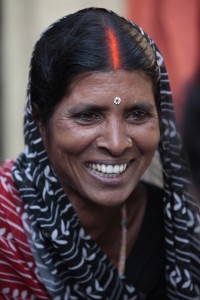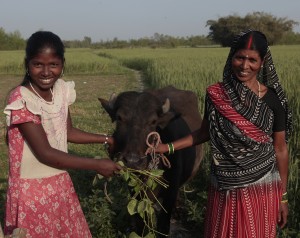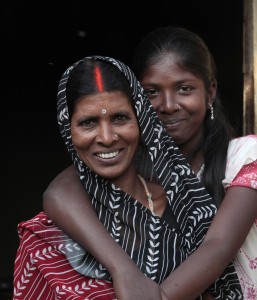Women own less than one percent of the land in developing countries, yet are responsible for producing 80 percent of the food. Bringing women together is where strength lies. Heifer empowers women around the world because a family can lift themselves out of hunger and poverty easier when men and women learn to share their roles and responsibilities.
 Photo by Russell Powell, courtesy of Heifer International
Photo by Russell Powell, courtesy of Heifer InternationalWomen, like Sunaina Devi in India, know this firsthand.
Five years ago, Sunaina and her family were living day to day. Her husband, Laxmi Thakur, worked as a carpenter, but his small income could not provide the family’s basic needs. Sunaina leased a young goat each year – fattening it until she could sell it at a local market. She then split the profit with the goat’s owner. They found themselves falling further and further behind and eventually turned to a local money lender with an interest rate of 20 percent to cover the bare necessities.
Everything changed when Sunaina joined the Rani Women’s Group.
She was intimidated by having to complete a year of extensive training before receiving any livestock from Heifer. “I had never gone to school or been trained to do anything,” she said. “I felt as if I had no knowledge, and I was afraid I would not be smart enough to understand what Heifer needed to teach me.”
Sunaina finished her training and was the first woman in her village to receive livestock and seedlings from Heifer. She received three goats, a breeding buck, seven chickens, seedlings for vegetables and two fruit trees. Her family’s income and health slowly improved.
A clever business woman, she now owns a small plot of land where she grows vegetables for her family and they sell the surplus at a local market. Three of their chickens consistently lay an egg each day and they sell about 15 eggs each month. She hopes to start selling tamarind and lemons from her fruit trees soon. With part of their income, she bought a water buffalo calf to start an income-producing milking business.
 Photo by Russell Powell, courtesy of Heifer International
Photo by Russell Powell, courtesy of Heifer InternationalShe is amazed by the health benefits of an improved diet and better sanitation. Four years ago, her son Mukesh, now 23, was too sick to work. Now he has steady work and contributes to the family’s income. Her grandson, Adkit, 6, suffered from chronic upper respiratory problems. At the time, she could not pay for his medical care and turned to the local money lenders. She was discouraged because the medical care did little to help and her husband’s salary was needed to pay back their debt. Now Adkit is much healthier and doesn’t need continual medical care. Sunaina is now confident their income will cover any medical costs that arise. And if a medical bill exceeds her ability to pay, she has a backup plan–the other members of the Rani Women’s Group.
 "I am so grateful for what the Heifer donors have done for me and my family and my women's group."
"I am so grateful for what the Heifer donors have done for me and my family and my women's group."Part of the success of Heifer’s work relies upon Heifer’s 12 Cornerstones for Just and Sustainable Development®. Sunaina’s favorite cornerstone is Sharing and Caring. “This brings women together, and that is where our strength lies, with each other,” she said. The Rani Women’s Group demonstrates Sharing and Caring through their cooperative fund. This financial safety net allows members to contribute money regularly knowing if a need arises they can borrow from this fund instead of the money lenders. This is a sense of pride and relief for these women.
Sunaina, always an optimist, flashes a brilliant smile when asked if she is surprised by her accomplishments. She never dreamed her family could be in such a fortunate position. Her daughters are growing up in a different village from when she was a child. The women have status and make important decisions that affect their families and their community. “My husband has always treated me with respect, but now there is something added,” she said. “Before, he made all the decisions about the family, including how money was to be spent. Now, we talk together about family matters and make joint decisions.”
Click here to empower women like Sunaina with the gift of livestock and training.